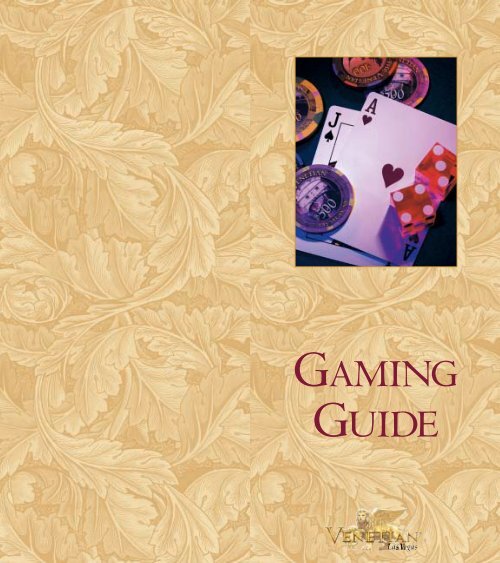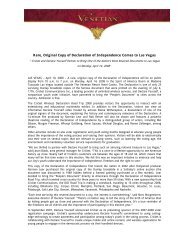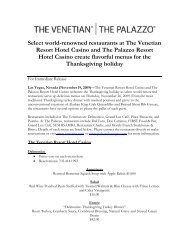gaming guide brochure - Venetian
gaming guide brochure - Venetian
gaming guide brochure - Venetian
You also want an ePaper? Increase the reach of your titles
YUMPU automatically turns print PDFs into web optimized ePapers that Google loves.
GAMING<br />
GUIDE
PREMIER GAMING IN A<br />
VENETIAN PALAZZO<br />
With the authorization of Ridotto<br />
in 1638, Venice gave Europe its<br />
first <strong>gaming</strong> houses.<br />
Welcome to The <strong>Venetian</strong> Resort-Hotel-Casino. This<br />
<strong>guide</strong> is provided to assist you with questions you might<br />
have about <strong>gaming</strong> in our state-of-the-art casino.<br />
Here you’ll find all the information needed to learn<br />
such exciting games as Craps, Pai Gow Poker, Baccarat,<br />
Blackjack, Roulette, and more. Please read through each<br />
section completely to acquaint yourself with the rules<br />
and regulations for each game. Once you’ve learned how<br />
to play the games you choose to play, it will make for a<br />
better <strong>gaming</strong> experience.<br />
Your <strong>Venetian</strong> <strong>gaming</strong> experience can be even more<br />
rewarding if you choose to become a member of The<br />
<strong>Venetian</strong> Players Club. The <strong>Venetian</strong> Players Club<br />
Card makes you eligible for a variety of benefits including<br />
invitations to special events, invitations to casino<br />
promotions, special rates on rooms, food, beverages and<br />
more. To receive your complimentary membership,<br />
please sign up at www.venetian.com/vpc.<br />
We hope you will find this <strong>guide</strong> informative; however,<br />
a guest of The <strong>Venetian</strong> should always feel free to<br />
ask questions. When you are at The <strong>Venetian</strong> and<br />
require assistance, please do not hesitate asking any of<br />
our casino staff, including the dealers.
SLOTS<br />
The <strong>Venetian</strong> offers a wide variety of slot machines. Our<br />
slots range in denomination from 5c to $500. Slot<br />
machines that are $1 or above operate on tokens, which<br />
can be purchased from any Slot Cashier booth on the<br />
casino floor, the Casino Cage, dollar carousels, or change<br />
attendants who circulate on the casino floor. For immediate<br />
service, all of our slots are equipped with bill acceptors<br />
that allow you to purchase tokens in the form of credits<br />
on your machine without leaving your seat.<br />
The <strong>Venetian</strong> Resort-Hotel-Casino offers many unique<br />
game themes and MEGA Jackpot progressive machines.<br />
The highest progressive jackpot prizes range from hundreds<br />
of dollars to more than $10 million. A large variety<br />
of exciting multi-line, multi-coin, interactive bonus<br />
screen games are also offered. The <strong>Venetian</strong> slot Team<br />
Members of the floor will be happy to show you how to<br />
play any of the slots or answer any questions you may<br />
have. All machines offer one of two methods of instructions.<br />
Interactive help screens and written instructions on<br />
the glass are offered on video machines for your convenience<br />
Don’t forget to join the <strong>Venetian</strong> Players Club before you<br />
play your favorite slot machines. Once enrolled, simply<br />
insert your <strong>Venetian</strong> Players Club card into the card reader<br />
and start earning points. Points can be redeemed for<br />
cash back and can also earn you valuable complimentary<br />
services. It’s our way of recognizing and rewarding our<br />
valued players every time they play.<br />
To join today, stop by our conveniently located <strong>Venetian</strong><br />
Players Club booth and ask any <strong>Venetian</strong> Slot Team<br />
Member to assist you with your club sigh-up – the privilege<br />
is ours!<br />
BACCARAT<br />
Baccarat (pronounced Bah-ka-rah) has long been among<br />
the most popular casino games in Europe and Latin<br />
America, and, contrary to its appearance, is probably the<br />
simplest game to play.<br />
The object of baccarat is to bet on one of two hands,<br />
the one you think will come closest to nine. Nine is<br />
the highest hand. Ten value cards have zero value. Aces<br />
always count as one.<br />
If the cards dealt total more than nine on either hand,<br />
they acquire the value of the second digit. Example:<br />
10=0 17=7 20=0 23=3.<br />
The shoe holds eight decks of cards. It is passed<br />
around the table from player to player, counter-clockwise,<br />
every time a player hand wins.<br />
This encourages each player to take an active part in<br />
dealing the game. Before cards are dealt from the shoe,<br />
everyone places their bet on the side they think will<br />
win (Banker or Player). The player with the shoe then<br />
deals four cards alternately. Two are designated Player<br />
cards; two are designated Banker cards. The croupier<br />
announces the total of each hand and, if the rules<br />
require, will call for a possible third card for either<br />
side. (See chart.) The winning third card for either side<br />
is announced, losing bets are collected and winning bets<br />
are paid even money.<br />
All winning bets on the bank side are assessed a five<br />
percent commission. The croupier will keep a running<br />
account of your commission which must be paid at<br />
the completion of the shoe (you may pay your commission<br />
anytime during the game).<br />
There is one other bet called the “tie.” You are betting<br />
that both the player and banker hands will tie. If they<br />
tie, you will be paid 9 for 1.<br />
We invite you to sit down at any of our baccarat<br />
games where our dealers will be glad to show you the<br />
game and answer any further questions.
Basic Rules to Remember:<br />
1. If banker and/or player hand has a total of eight or<br />
nine on first two cards, no further cards are drawn.<br />
2. Player hand having zero to five must draw one<br />
card. Player hand having six or seven must stand.<br />
3. Banker hand stands or draws one card as directed<br />
by the chart.<br />
Mini-Baccarat offers the same excitement and fun that<br />
baccarat does. The same rules apply as in baccarat. In<br />
Mini-Baccarat, the croupier is the only person permitted<br />
to deal the cards.<br />
Player Hand Third Card Rule<br />
When a player’s first two cards total: Player’s hand:<br />
0-1-2-3-4-5 Draws a card<br />
6-7 Stands<br />
8-9 Natural stands<br />
Banker<br />
When banker’s Draws when Does not draw<br />
first two cards player’s third when player’s<br />
total: card is: third card is:<br />
0-1-2 Banker’s hand always draws on<br />
a two-card total of 0-1-2<br />
3 1-2-3-4-5-6-7-9-0 8<br />
4 2-3-4-5-6-7 1-8-9-0<br />
5 4-5-6-7 1-2-3-8-9-0<br />
6 6-7 1-2-3-4-5-8-9-0<br />
7 Stands<br />
8-9 Natural stands
BLACKJACK<br />
Blackjack, or 21, is one of the most popular card games<br />
played at The <strong>Venetian</strong>. It is easy to learn and exciting to<br />
play. The <strong>Venetian</strong> provides two versions of this game:<br />
Double Deck 21 where the cards are dealt from the<br />
hand, and Multiple Deck 21 where the cards are dealt<br />
from a box called the “shoe.”<br />
In blackjack, everyone plays against the dealer.<br />
In the hand dealt game, the players are dealt<br />
two cards face down. In the shoe dealt version, players<br />
receive both cards face up. In both versions, the dealer<br />
receives his/her first card face up and the second card face<br />
down. The object of the game is to get as close as possible<br />
to 21 without going over 21. If a hand goes over 21,<br />
it is called a “bust” or “break” and the wager is lost. In<br />
21, Jacks, Queens, Kings and tens count as 10. An Ace<br />
may be played as a one or an 11. All other cards are<br />
played at face value.<br />
When you receive your first two cards, you may either<br />
“stand” or “hit.” When you “stand” it means you feel you<br />
are close enough to 21 and no longer wish any additional<br />
cards. If you wish to receive another card or “hit,” scratch<br />
the surface of the table with your first two cards (hand<br />
dealt games only). If you wish to “stand” simply tuck<br />
your cards underneath your bet.<br />
In the shoe dealt version, you don’t need to touch your<br />
cards, simply indicate a “hit” or “stand” by using hand<br />
signals. In both methods of play, you may draw as many<br />
cards as you want until you are close to 21 or until you<br />
“bust” or “break.”<br />
If you are closer to 21 than the dealer, you win and are<br />
paid an amount equal to your original wager. If your<br />
hand is less than the dealer’s, you lose. If the dealer’s<br />
hand “busts” or “breaks,” you win as well. Ties are a<br />
standoff or “push” and your bet remains on the table.<br />
If your initial two cards total 21, any Ace with a 10,<br />
Jack, Queen or King, you have a blackjack. Blackjack<br />
is paid 3 to 2.<br />
In 21, the player has many options to<br />
choose from:<br />
SPLITTING PAIRS<br />
If your first two cards have the same numerical value,<br />
you may split them into two hands. The bet on the<br />
second hand must equal the original bet. If the split<br />
pair is Aces, you are limited to a one card draw on<br />
each hand.<br />
DOUBLING DOWN<br />
After receiving your first two cards you may elect to<br />
wager an additional amount not to exceed the value of<br />
the original bet. With a<br />
double down, you will be dealt one additional card<br />
only.<br />
INSURANCE<br />
If the dealer’s face up card is an Ace, you may elect to<br />
take insurance. The insurance bet is a wager that the<br />
dealer has a blackjack. You may bet up to one half of<br />
your original bet. Insurance bets pay 2 to 1 if the dealer<br />
has a blackjack, but lose in all other instances.<br />
SURRENDER<br />
Players have the option of surrendering one half of their<br />
original wager after receiving their first two cards. If you<br />
surrender your cards, the dealer will take half of your<br />
wager. (Note: the Surrender option is not available on the<br />
Double Deck game.)
Blackjack without<br />
face card.<br />
You may split<br />
any pair.<br />
If you split aces,<br />
you get one hit<br />
on each.<br />
Blackjack with<br />
face card.<br />
You may double<br />
down on<br />
any two cards.<br />
CRAPS<br />
Craps is an exciting, fast-paced, action-packed game<br />
utilizing a pair of dice. Here are some basics to get you<br />
started shooting craps.<br />
One player, known as the “shooter,” throws<br />
the dice. All wagers must be placed before the shooter<br />
throws the dice. The types of wagers that can be made<br />
are:<br />
PASS LINE<br />
An even money bet, made on the first roll of the dice<br />
(known as the “come out roll”). You win if a 7 or 11<br />
roll, or lose if 2, 3 or 12 roll (known as “craps”). Any<br />
other number that rolls becomes the “point” and the<br />
point must roll again before a 7 to win.<br />
DON’T PASS LINE<br />
An even money bet which is the opposite of the pass<br />
line. You lose on the “come out” roll if the shooter<br />
rolls a 7 or 11. You win on a 2 or 3 (12 is a tie). Once<br />
a point is established, you lose if the point is thrown<br />
and win if a 7 rolls.<br />
COME BETS<br />
Made anytime after the first roll when a shooter has a<br />
point to make. You win on a 7 or 11 and lose on a 2,<br />
3 or 12. Any other number becomes your “come<br />
point” and must be repeated for you to win before a 7<br />
rolls.<br />
DON’T COME BETS<br />
Made anytime after the first roll when a shooter has a<br />
point to make. It is the opposite of the come bet. You<br />
win if 2 or 3 roll (12 is a tie), and lose if 7 or 11 roll.<br />
Any other number rolled becomes your “come point”<br />
and if repeated you lose. If a 7 rolls you win.
ODDS<br />
Once a point is made on the first roll or a come point<br />
on a succeeding roll, you may take the odds and win if<br />
the point or come points are made before a 7. Payoffs<br />
are: 2 to 1 on 4 and 10, 3 to 2 for 5 and 9, 6 to 5 on 6<br />
and 8. “Don’t pass” or “don’t come” bets are in reverse:<br />
you must lay the odds in order to win.<br />
PLACE BETS<br />
Once a shooter makes a point, you may make a “place<br />
bet” on numbers 4, 5, 6, 8, 9 and 10. If the shooter rolls<br />
any of these numbers before a 7, you win the following<br />
payoffs: 9 to 5 on 4 and 10, 7 to 5 on 5 and 9, and 7 to<br />
6 on 6 and 8.<br />
A “place bet” may be taken off anytime before the next<br />
roll.<br />
FIELD BETS<br />
A one roll bet. You win even money on 3, 4, 9, 10 and<br />
11. You win 2 to 1 on 2. You win 3 to 1 on 12. You<br />
lose on 5, 6, 7 or 8.<br />
PROPOSITION BETS<br />
These bets are found in the center of the table and are<br />
one roll bets. You are betting that on the very next roll<br />
of the dice any of these<br />
numbers will come up:<br />
Any craps (2, 3 or 12) pays 8 for 1<br />
Aces (2) or Twelve (12) pays 31 for 1<br />
Ace-Deuce (3) or Eleven (11) pays 16 for 1<br />
Seven (7) pays 5 for 1<br />
HARDWAYS<br />
A Hardway bet is not a one roll bet. You are betting<br />
that the shooter rolls a pair. Hardways win if the dice<br />
roll as a pair and lose if a 7 rolls or if the number is<br />
thrown “the easy way.” Example: If you bet a hard 8<br />
and the dice roll 4,4 you win. If the dice roll “easy”<br />
5,3 or 6,2 you lose.<br />
Hard Four or Ten pays 8 for 1<br />
Hard Six or Eight pays 10 for 1
ROULETTE<br />
Roulette is an intriguing game that is played throughout<br />
the world. The large payoffs that are possible for small<br />
wagers always stimulate the interest of the expert as well<br />
as the novice player.<br />
Different players use different colored chips so the bets<br />
are not confused. The value of your chips is determined<br />
by the price you pay for them.<br />
Each spin of the wheel provides a multitude<br />
of options for the player. A player may bet on<br />
single numbers, rows of numbers or on adjacent numbers.<br />
A player also may play colors, odd or even numbers,<br />
among others. A bet on a single number pays 35<br />
to 1, including the 0 and 00. Bets on red or black, odd<br />
or even pay 1 for 1, or even money.<br />
The chips you use when playing roulette are not<br />
redeemable by the cashier nor are they good<br />
at any other game. Be sure to exchange your roulette<br />
chips at the table. They have no value<br />
in any other section of the casino.<br />
The <strong>Venetian</strong> is proud to offer roulette in two variations.<br />
In addition to our popular American style<br />
roulette game with 36 numbered slots, a 0 and a 00, we<br />
also offer our European roulette, which has a single 0<br />
along with the standard 36 numbers, and is a favorite<br />
among our international customers.<br />
The diagram indicates the payoffs for single chip bets<br />
and the many combinations available to you. The dealer<br />
will be happy to explain any of them. The exact placement<br />
of the chips determine the bet being made. Each<br />
player is responsible for the correct positioning of their<br />
wager on the layout regardless of whether the bet is<br />
placed by the dealer.<br />
1. Single number bet pays 35 to 1. Also called<br />
“straight up.”<br />
2. Double number bet pays 17 to 1. Also called a<br />
“split.”<br />
3. Three number bet pays 11 to 1. Also called a<br />
“street.”<br />
4. Four number bet pays 8 to 1. Also called a “corner<br />
bet.”<br />
5. Five number bet pays 6 to 1. Only one<br />
specific bet which includes the following numbers:<br />
0-00-1-2-3.<br />
6. Six number bets pays 5 to 1. Example: 7, 8, 9, 10,<br />
11, 12. Also called a “line.”<br />
7. Twelve numbers or dozens (first, second, third<br />
dozen) pays 2 to 1.<br />
8. Column bet (12 numbers in a row)<br />
pays 2 to 1.<br />
9. 18 numbers (1-18) pays even money.<br />
10. 18 numbers (19-36) pays even money.<br />
11. Red or black pays even money.<br />
12. Odd or even bets pay even money.<br />
9<br />
12<br />
11<br />
11<br />
12<br />
10<br />
7<br />
7<br />
7<br />
5<br />
6<br />
3<br />
1 2<br />
4<br />
8 8 8
PAI GOW<br />
The game of Pai Gow (pronounced Pi Gow) is<br />
a game of Chinese dominoes, which is generally<br />
believed to have originated in China around the 12th<br />
century A.D. The name Pai Gow literally translated<br />
means “to make nine,” which will give some idea of the<br />
object of the game.<br />
Pai Gow is played on a table and setting similar to<br />
blackjack: there is a dealer and seats for up to seven<br />
players. However, instead of cards,<br />
the dealer distributes dominoes to the players. There<br />
are 32 dominoes (sometimes referred to as “tiles” or<br />
“cards”) which are mixed or shuffled by the dealer. The<br />
dominoes are placed in eight stacks of four dominoes<br />
each. These are dealt to each position on the table<br />
(including any vacant positions) so that each player<br />
receives four dominoes.<br />
Unlike the American game of dominoes, in Pai Gow<br />
the individual value of a domino is NOT based on the<br />
number of dots on it. Its value is based upon a symbolic<br />
Chinese meaning, which you do not need to<br />
know to play the game. Until you become familiar with<br />
the rankings, it is best to refer to the accompanying<br />
chart for the numerical rankings of the dominoes.<br />
Each player uses his four tiles to form two<br />
separate hands. The best hand is referred to as the<br />
“high hand” and the other hand is called the “low<br />
hand.” If the player’s high hand is higher than the<br />
banker’s high hand, and the player’s low hand is also<br />
higher than the banker’s low hand, the player is a winner.<br />
If both his hands rank lower than both the<br />
banker’s hands, he loses his bet. If only one of his<br />
hands is higher, and the other is lower, it is a “standoff”<br />
or “push” and no money changes hands. If the<br />
player and the banker have two hands totaling the<br />
same number, the hand with the higher<br />
“single ranking” domino (see chart) is the<br />
winner. The banker always wins if the two hands are<br />
exactly identical.<br />
The highest hand would be a pair (called<br />
a “Bo” in Chinese); however, not all of the<br />
combinations called “pairs” are actually pairs of identical<br />
dominoes. Be careful to consult the chart when you are<br />
dealt your dominoes to see<br />
if you have one of the “chop” or mixed pairs.<br />
Keep this mixed pair of 7s.<br />
Keep your eye open for these<br />
types of pairs.<br />
The next highest would be what is called a “Wong,”<br />
which is the nine domino together with a 2 or a 12<br />
domino. After the Wong comes the “Gong,” which is<br />
an eight domino together with a 2 or a 12.<br />
This is a Wong.<br />
Only a pair can beat this!<br />
If you cannot make any of these combinations, you<br />
must arrange your two dominoes to get as close to a<br />
total of nine as possible. At this point, the game is similar<br />
to playing two hands of baccarat, with nine being<br />
the highest possible total. As in baccarat, only the last<br />
digit of the total is counted: two dominoes which total<br />
11 will only count as 1, a total of 15 will count as 5,<br />
etc.<br />
Learning how to play Pai Gow means learning how to<br />
form the best two hands using the four dominoes you<br />
are dealt.<br />
The following are four basic rules to <strong>guide</strong> you in setting<br />
your hands:<br />
1. Play the pairs: the Gee Joon, 11 identical pairs, and<br />
four mixed pairs. Look for these pairs and play<br />
them as your “high hand.”<br />
2. Play a 12 or a 2 with a 7, 8 or 9 to produce either a<br />
high 9, a Gong or a Wong. These are the most common<br />
“high hands” and are very powerful.<br />
3. Play two small dominoes that add up to 7, 8 or 9.<br />
4. Average the hands by playing the biggest domino<br />
with the smallest. This is the last resort. Play a balanced<br />
hand if you have nothing else.
There are two “wild” dominoes in Pai Gow:<br />
the 3 domino and the 6 domino which is formed by a<br />
red four and a white two. BOTH can be counted as<br />
either 3 or 6, and together they form the highest hand,<br />
called “Gee Joon.” It is considered a pair, even though<br />
these dominoes obviously do not match. Watch for<br />
these “wild” dominoes and use them in figuring your<br />
domino totals.<br />
This is a “Gee Joon.”<br />
Together they’re the highest pair;<br />
individually they can be<br />
a 6 or a 3!<br />
On the table, there is also a dice cup with three dice<br />
inside. The purpose of the dice cup is only to determine<br />
which position on the table will receive the first<br />
hand. The counting always starts from the banker<br />
(who is not always the dealer), and proceeds around<br />
the table in a counter-clockwise manner. If the dice<br />
total 9 or 17, the banker will receive the first stack of<br />
dominoes. If the total is 10 or 18, the player to the<br />
banker’s immediate right will receive the first stack,<br />
and so on.<br />
Pai Gow is a rotating bank game. Each player has the<br />
opportunity to bank the bets against all other players,<br />
including the house dealer. The dealer will offer the bank<br />
to each player in turn, moving counter-clockwise. The<br />
player has the option of either accepting the bank or<br />
passing it on to the next player. If no one accepts the<br />
bank, it goes back to the dealer. To be banker, a player<br />
must have played the previous hand against the house<br />
and must be able to cover all bets. He may also choose<br />
to co-bank with the house, in which case he must cover<br />
half the bets. If he chooses to co-bank, his dominoes<br />
must be set by the dealer according to the standard<br />
“house way.” The house retains 5% commission on each<br />
winning hand.<br />
The dealers and floor supervisors will be glad<br />
to answer your questions about Pai Gow or to set your<br />
hand for you if you are unsure of how to proceed.<br />
“Day”<br />
3rd 4th 5th 6th 7th 8th<br />
“Teen”<br />
“Gee Joon”<br />
2nd<br />
1st<br />
PAIR RANK<br />
11th 12th 13th 14th 15th 16th<br />
10th<br />
9th<br />
20th<br />
19th<br />
18th<br />
17th<br />
OR OR<br />
OR OR<br />
WONG: OR<br />
OR GONG:<br />
1st 2nd 3rd 4th<br />
5th 6th 7th 8th 9th 10th 11th<br />
SINGLE RANK<br />
15th 16th<br />
17th<br />
14th<br />
13th<br />
12th<br />
OR<br />
OR<br />
OR<br />
OR
PAI GOW POKER<br />
Pai Gow Poker, which is sometimes called “Asian<br />
Poker,” is an exciting game that is played with an ordinary<br />
deck of 52 cards plus one joker. The joker is used<br />
as an Ace or to complete a straight or a flush.<br />
The dealer shuffles his deck and then proceeds to deal<br />
out the cards in seven stacks of seven cards each.<br />
The dealer then shakes the dice cup, which is used to<br />
determine who will receive the first hand. The dice are<br />
totaled, and the dealer counts counter-clockwise from<br />
the “chung” (or marker), which indicates who the<br />
banker is. The banker is always counted as #1, 8 or 15.<br />
The dealer then hands out each stack of cards to the<br />
player’s positions as indicated on the layout.<br />
The players then arrange the seven cards dealt to them<br />
into two hands; one hand will contain five cards and is<br />
known as the high hand; the other hand will contain<br />
two cards and is the second highest hand. Once the<br />
two hands are formed, they are placed face down in<br />
the positions indicated on the layout.<br />
To win your bet, both your high hand and your second<br />
highest hand must rank higher than the respective<br />
hands of the banker. If you have even a little knowledge<br />
of traditional poker, this game will come easy to you,<br />
because poker ranking procedures are used in determining<br />
which hand is higher.<br />
The only requirement in forming the two hands is that<br />
the second highest hand must contain only two cards<br />
and must be a lower ranking hand than the hand containing<br />
five cards.<br />
If this requirement is not satisfied, the hand is declared<br />
a “foul hand” and the wager is automatically forfeited.<br />
After all players have arranged their hands, the dealer<br />
will set the house’s hand.<br />
When your hand is compared to the house (or the<br />
banker’s) hand and both the second highest hand and the<br />
high hand rank higher than the house (or banker’s), then<br />
you win! If both hands rank lower, you lose your wager.<br />
In order for money to exchange hands, both the second<br />
highest hand the high hand must either both win, or both<br />
lose.<br />
If either one wins and the other loses, then the wager is a<br />
“push” and no money exchanges hands. The bank always<br />
wins if the hand is identical.<br />
The house will handle all bets and will charge a 5% commission<br />
on all winning wagers.<br />
There is no commission for “pushed” or losing wagers.<br />
Another exciting aspect of Pai Gow Poker is<br />
that any player may act as the banker! The only requirement<br />
for being the banker is that you must be able to<br />
cover all wagers on the layout at that time. When a player<br />
acts as the banker, all other player’s hands are compared to<br />
the banker’s hand and not the dealer’s. When a player<br />
banks, the house will wager an amount equal to that player’s<br />
bet on the preceding hand.<br />
The house will always take the bank when it is its turn, or<br />
when no player wishes to take the bank.<br />
A word of caution – avoid exposing your hand at the table. It does<br />
not matter when the house is the bank because the house must set its<br />
hand as prescribed by our House Ways. However, when another player<br />
is the bank, you will be giving that player an advantage if he sees<br />
how you set your hand.<br />
If you require assistance, the dealer or floor-person will be<br />
happy to assist you in setting the highest possible ranking<br />
according to The <strong>Venetian</strong> House Ways. However, we<br />
cannot be responsible for any losses that may be incurred.<br />
POKER HAND RANKINGS<br />
FIVE ACES<br />
(including joker)<br />
ROYAL FLUSH<br />
STRAIGHT FLUSH<br />
FOUR OF A KIND<br />
FULL HOUSE<br />
FLUSH<br />
STRAIGHT<br />
(A,2,3,4,5 is the second highest straight)<br />
THREE OF A KIND<br />
TWO PAIR<br />
ONE PAIR<br />
HIGH CARD
LET IT RIDE STUD POKER<br />
This exciting variation of five card stud poker is easy<br />
to learn and fun to play. Each player places one bet of<br />
three equal bets and receives three cards, while the<br />
dealer deals two “community” cards face down. After<br />
looking at your first three cards, you may ask for one<br />
of your bets back or you may “Let It Ride.” The dealer<br />
then turns up one card. You may then ask for your<br />
second bet back or “Let It Ride.” The second card is<br />
then turned over by the dealer exposing both community<br />
cards. At this point, all winning hands are paid<br />
according to the payout schedule (pair of 10s or better,<br />
two pair, etc.).<br />
The object is to get as good a hand as possible and<br />
bets are paid based on the schedule printed below.<br />
Players do not play against each other or against the<br />
dealer.<br />
PAYOUT SCHEDULE<br />
ROYAL FLUSH.......................................... 1000 to 1<br />
STRAIGHT FLUSH .................................. 200 to 1<br />
FOUR OF A KIND.................................... 50 to 1<br />
FULL HOUSE............................................ 11 to 1<br />
FLUSH ....................................................... 8 to 1<br />
STRAIGHT ................................................ 5 to 1<br />
THREE OF A KIND ................................. 3 to 1<br />
TWO PAIR................................................. 2 to 1<br />
PAIR OF 10s OR BETTER........................ 1 to 1<br />
NOTE: MAXIMUM AGGREGATE PAYOUT OF $50,000 PER<br />
ROUND<br />
CARIBBEAN STUD POKER<br />
Caribbean Stud Poker offers the player the<br />
challenge of poker but uses an easier-to-play format. In<br />
addition, it is the first progressive play jackpot ever<br />
offered with a table game. It is played on a special table,<br />
similar to blackjack, it is based on five card stud poker. Each<br />
player antes with the option of playing for a progressive<br />
jackpot and receives five cards face down. The dealer gets<br />
five cards with one card face up. The players examine their<br />
hands and decide to either fold, forfeiting the ante, or to<br />
make an additional bet, doubling the ante.<br />
The dealer can only qualify and continue with an<br />
Ace/King or better. Without this minimum, the player<br />
automatically wins the ante and that hand is over. If the<br />
dealer can open and the player wins the hand, the player<br />
collects his/her ante and additional bet. Winning<br />
hands are paid out in accordance with the standard payout<br />
schedule, shown below. It is the player’s responsibility<br />
to inform the dealer when they have a flush or higher.<br />
PAYOUT SCHEDULE<br />
ROYAL FLUSH.......................................... 100 to 1<br />
STRAIGHT FLUSH .................................. 50 to 1<br />
FOUR OF A KIND.................................... 20 to 1<br />
FULL HOUSE............................................ 7 to 1<br />
FLUSH ....................................................... 5 to 1<br />
STRAIGHT ................................................ 4 to 1<br />
THREE OF A KIND ................................. 3 to 1<br />
TWO PAIR................................................. 2 to 1<br />
PAIR OF 10s OR BETTER........................ 1 to 1<br />
NOTE: MAXIMUM PAYOUT OF $5,000 BET WAGER
CARIBBEAN STUD POKER<br />
PROGRESSIVE JACKPOT<br />
Players who wish to qualify for the Progressive Jackpot<br />
must place a separate wager by putting a $1 <strong>gaming</strong><br />
chip in the acceptor slot located in front of each player.<br />
They qualify for the jackpot when they draw one of the<br />
five hands listed below regardless of whether the dealer’s<br />
hand is higher, lower or qualifies. The progressive<br />
jackpot pays out fixed amounts for lower hands and a percentage<br />
of the total jackpot for higher hands.<br />
PROGRESSIVE JACKPOT<br />
ROYAL FLUSH..................................................100%<br />
STRAIGHT FLUSH.............................................10%<br />
FOUR OF A KIND .............................................$500<br />
FULL HOUSE .....................................................$100<br />
FLUSH...................................................................$50<br />
BIG SIX<br />
The <strong>Venetian</strong> is proud to present the Big Six Wheel<br />
also known as the Wheel of Fortune. This is an easy<br />
game to play and loads of fun.<br />
Bets are made by placing a chip on the layout in one of<br />
the boxes. These boxes correspond to the numbers on<br />
the wheel and indicate the payoff rates. Bets must be<br />
made before the wheel is spun. Wagers are paid off<br />
immediately after the wheel stops on a number. If that<br />
number is the one you put your money on, you’re a winner.<br />
The higher the odds, the larger the payoff.
THREE CARD POKER<br />
The player has the option of making two separate<br />
wagers at the start of each game. Three cards will be<br />
dealt to each player and three cards will be dealt to the<br />
dealer.<br />
The first wager is called the “Pair Plus.” This bet wins<br />
with a player’s hand of a pair or higher. Winning pair<br />
plus bets will be paid in accordance with the following<br />
payout schedule.<br />
• Pair - 1 to 1<br />
• Flush - 3 to 1<br />
• Straight - 6 to 1<br />
• 3-of-a-kind - 30 to 1<br />
• Straight Flush - 40 to 1<br />
The second wager that can be made is called the<br />
“Ante.” This bet is made in order to play against the<br />
dealer. The object of the bet is to have a hand that<br />
ranks higher than the dealer’s hand. After receiving the<br />
three cards, the player decides to either play the hand<br />
or fold. If the decision is to play the hand, the player<br />
places an additional bet (equal to the ante wager) in<br />
the “play” box. The Dealer must have a Queen or better<br />
to qualify. If the dealer does not qualify, the player<br />
automatically wins the ante, and the play bet is a<br />
“push” (it does not win or lose). If the dealer qualifies<br />
and the player’s hand is higher than the dealer's, the<br />
player will be paid even money plus a bonus for the<br />
following hands:<br />
• Straight -1 to 1<br />
• 3-of-a-kind - 4 to 1<br />
• Straight Flush 5 to 1<br />
Any of our friendly dealers will be happy to answer<br />
any questions you may have about Three-Card Poker.<br />
Join Us!<br />
SPANISH 21<br />
Spanish 21 is played just like Blackjack but with eight<br />
“Spanish Decks” (A – 9, Jacks, Queens, Kings - no<br />
10’s)<br />
With Spanish 21, the player is offered numerous odds<br />
that make the game fun and exciting.<br />
• Player Blackjack always beats dealer’s Blackjack –<br />
pays 3 to 2<br />
• Player total of 21 always beats dealer’s total of 21<br />
– pays up to 3 to 1*<br />
• Double Down with 2 or more cards on any total<br />
• Double Down Rescue – If a player is dissatisfied<br />
with his/her non-busted hand, he/she may rescue<br />
(take back) the Doubled portion of the bet, and<br />
forfeit the original wager<br />
Additional Bonus 21 Payoffs<br />
• 5 Card 21 Pays 3 to 2<br />
• 6 Card 21 Pays 2 to 1<br />
• 7+ Card 21 Pays 3 to 1<br />
• 6-7-8 Mixed Suits Pays 3 to 2<br />
• 6-7-8 Suited Pays 2 to 1<br />
• 6-7-8 Spaded Pays 3 to 1<br />
• 7-7-7 Mixed Suits Pays 3 to 2<br />
• 7-7-7 Suited Pays 2 to 1<br />
• 7-7-7 Spaded Pays 3 to 1<br />
Super Bonus<br />
• Player holds suited 7-7-7 and Dealer upcard is<br />
any 7<br />
• $5 to $24 bet wins $1000<br />
• $25+ bet wins $5000
CASINO WAR<br />
Casino War, the game you used to play as a kid is now<br />
offered at the <strong>Venetian</strong>.<br />
At the beginning of each game, the player makes an<br />
initial wager. One card is dealt to each player and one<br />
card is dealt to the dealer. To win the wager, the rank<br />
of the player’s card must exceed the rank of the dealer’s<br />
card. Winning wagers will be paid at a rate of 1 to 1.<br />
A tie wager is also an option and pays 10 to 1.<br />
If the player and dealer’s cards have the same rank<br />
(tie), the player is given the option to “War” with the<br />
“house.” The player makes an additional amount<br />
equal to the initial wager. Three cards are then<br />
“burned” for both the player and the dealer and one<br />
additional card is dealt to both. The highest-ranking<br />
card wins the “War.”<br />
It’s that simple!<br />
NEVADA LAW STATES THAT<br />
NO PERSON UNDER THE AGE OF 21<br />
YEARS SHALL BE PERMITTED TO:<br />
A. Play, or be allowed to play, any licensed game or<br />
slot machine.<br />
B. Place wagers with or collect winning wagers from<br />
any licensed Race Book, Sports Pool or Pari-<br />
Mutuel operator.<br />
C. Loiter, or be permitted to Loiter, in or about any<br />
room or premises wherein all licensed game, Race<br />
Book, Sports Pool or Pari-Mutuel Wagering is<br />
operated or conducted.<br />
WHEN THE FUN STOPS<br />
If you or someone you know is suffering<br />
the fear, frustration and anger of a gambling problem,<br />
you’re not alone.<br />
Just pick up a phone and dial:<br />
1-800-522-4700<br />
Problem Gamblers Helpline








